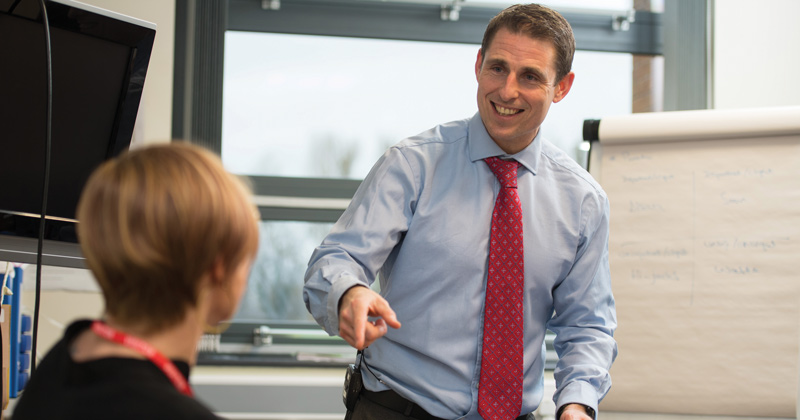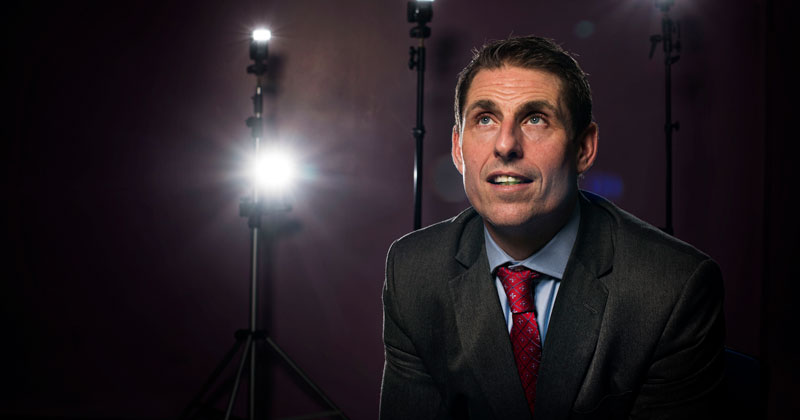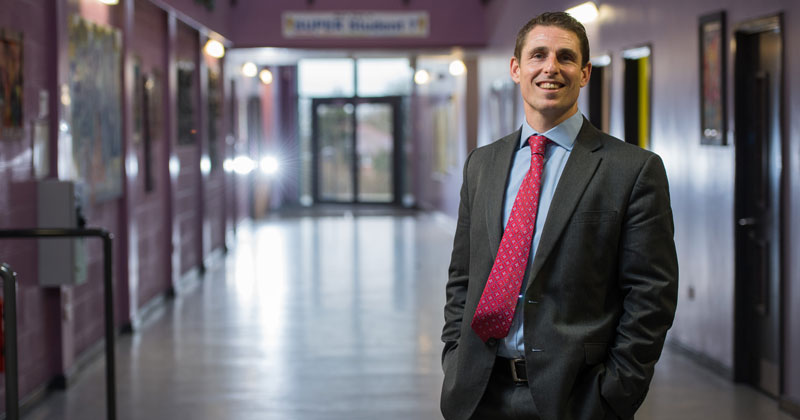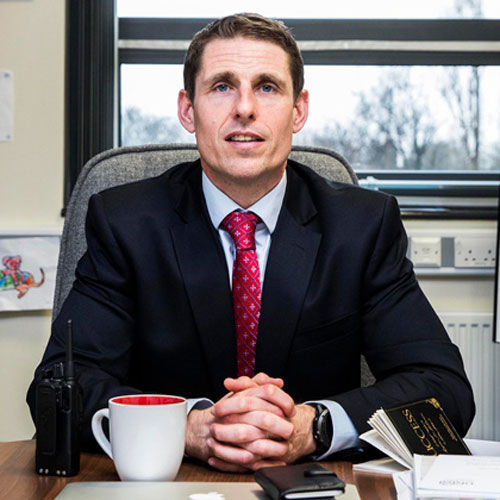For the first time in the history of Channel 4’s Educating series, the filmmakers have persuaded a school to let the cameras return for a second season.
From the channel’s point of view, it’s a no-brainer: Educating Greater Manchester, which aired in the autumn from Harrop Fold School in Salford, was a huge hit with the public. The cast is media-trained, the cables are already in the ceiling and the pupils no doubt have storylines or personas they intend to develop, to advance their teenage dreams of fame.
But why a headteacher – and board of governors – would expose their community to that kind of scrutiny a second time is not so clear.
We meet on day one of filming. Harrop Fold’s two-storey central hallway is teeming with camera operators and teachers attempting to fit “staged melees” around pupil crowd management. A teacher hands off his radio microphone to me, assuming I’m part of the crew.
This isn’t normal, insists headteacher Drew Povey: “You’d never do it if that was the case. You might do three or four days but you wouldn’t do the best part of a year. You’d never manage it.”
We are where we are, and no one’s helping us
Ceiling cameras will be installed over half term, so “it’s literally like having CCTV”. Except that it’s not: there’s also a camera crew inside a control room somewhere, watching your every move.
Povey won’t tell me the exact value of the disruption fee they receive, but you get the impression it won’t make much of a dint in the school’s multi-million-pound deficit, which was racked up over a decade ago through the combination of a PFI deal and the cost of a turnaround team when the school was failing, several years prior to Povey’s headship. Together this earned it the dubious accolade of “the most indebted school in the UK”.
If that weren’t enough, it had already been labelled “the worst school in the UK” by both Ofsted and the DfE back in 2003.
This is exactly the kind of superlative that the media laps up, but Povey insists it’s not hyperbole.
“It was in special special measures, an amalgamation of two schools that went wrong. Change management done at its worst, and what happened was it went into a really bad place and when the inspectors came in, they said ‘this is absolutely its own category of special measures’.” The school needed a full-time police officer – often two – to help deal with behaviour.

A school improvement partnership board was established, including Department for Education and local authority representatives. Money poured into Harrop Fold to turn it around: this was the pre-crash era, when everything could be put on credit. But after he was promoted from deputy to head in 2010 at the age of 32, he discovered that his school was in debt to the tune of £3 million – and expected to pay it all back.
This might explain why Povey can sound disconcertingly like a serial entrepreneur; once he gets going, he reels off a slew of commercial ideas, several to do with monetising the leadership materials he’s developed.
Where do you go for advice when you’re the worst school?
But shouldn’t a headteacher be focused on running the school, not raising funds?
“I know what you’re saying,” he replies, “but we are where we are, and no one’s helping us. And no one has helped us. I’ve been there in your shoes with my head on this part of the desk,” – he mimes banging his head – “but we have to do it. So I can sit here and whinge and moan or I can just get out and make it happen. And we’re making it happen.”
If Povey had earned his stripes as deputy head in charge of behaviour, he was no leadership expert when he was appointed, very young, to this gargantuan task.
“Paying back a deficit in a PFI setting when you’re already overspending and you’ve got a falling school roll [they went from 1,200 to 600 pupils] is the perfect financial storm. Everything that could possibly go wrong is going wrong.
“Where do you go for advice when you’re the worst school? Or where do you go for advice when you’ve been told you’ll never manage to pay this debt back?”

His team believed they could do it, however, and Povey, as their leader, started waking early to work on strategy. Specifically, at 4:56 am every day, “because it’s 4, 5, 6 – I looked at my clock and thought ‘I like that time’. What a loser.”
At this point he visibly reddens, and makes me promise I won’t make him look like too much of a nerd. While doing his morning circuit training, he would listen to leadership audiobooks, and in the breaks between sets, make notes.
He sticks to a similar routine to this day, although having made his way through about 450 leadership manuals to date, one wonders whether there’s much of worth left to read. Then comes yoga stretching, followed by a “mindful dog walk”, which involves “just getting my head in a good space for the day and focusing on not very much”.
Povey, who describes himself as “very, very average” and found academic learning difficult, has had to forge his own path.
I’ve not got the giftedness and the natural ability that other people might have, but I can work hard
“I’ve not got the giftedness and the natural ability that other people might have, but I can work hard,” he admits. He tells his pupils the same thing.
“We have this really bent view about success: it has to be somebody at the top, and it’s not. I never aspired to be a head but I was offered this job, and to lead Harrop is the biggest privilege ever. I don’t think I could be a head anywhere else. But running Harrop means everything to me and I’ll just do the best damn job I can while I’m here, and give it everything I’ve got. And then if I can give it everything I’ve got, as I say to the kids, I’m trying to be a better headteacher every day and I’m trying to get better at this this job of headship, and you need to be doing the same.
“And everybody’s got to have that same growth mindset, which sounds so twee now because we’re sick of saying it, but it’s very powerful. If the staff don’t believe and the kids don’t believe, you’re wasting your time. So belief is the foundation of everything, and it doesn’t matter if you’re not going to break any records. You can break records for yourself. It’s not about being the best. It’s about being the best version of you.”
As a novice head, he started trying out strategies from the books; some worked, some didn’t, so he’d adapt them or write his own materials.
Gradually his middle and senior leaders began to ask him to share, as did the rugby club where he coaches at weekends. One day the police came in for a meeting and, having asked him about the diagrams he has plastered all over the wall, invited him to do a talk, which led to an invitation from the NHS.
Povey – who uses “we” to signify that this is a team effort – has also worked with companies such as Allianz, Crawford Insurance, Warner Brothers and Mitie Facilities Management, which is, somewhat ironically and by total coincidence, the company that manages the school’s PFI contract.

“We manage to keep ourselves afloat doing that leadership work,” he says, which might be an understatement. One way or another, they have reduced the school’s debt by half.
One might suspect that Povey can make more for the school from his leadership talks than from a second TV series. So what’s in it for them? Could they be getting addicted to the buzz of celebrity?
“I don’t think so,” he says, as if momentarily reconsidering my sanity. “I don’t think anybody’s like that here. To be honest with you, you’re not really a celebrity, are you? I mean like, what’s celebrity about being an RE teacher? I love RE, it’s a great subject, but there’s nothing celebrity about it. (Povey started out as an RE teacher at William Beamont Community High School in Warrington, having done his undergraduate degree and PGCE at the University of Chester.)
“Some people have a mistaken view that we did this because we’re in love with ourselves, or we want to be on TV, or I want to be famous, or some of the staff want to be famous, or the kids. It was never about that for us.
The Educating brand has never made the schools look bad. That’s not really what it’s set up to do
“We’re doing it because this school has had a tricky past, reputationally. I mean, the fact that the school’s even open is miraculous; the amazing staff that have worked here, and the amazing kids and the community that supported us have kept us alive. It’s not being celebrated, and it should be.”
On screen, Povey is adept at flashing a smile and seems happy to play along with the kind of staffroom banter and pranks that add the magic to a hidden-camera series. But like other Educating headteachers who have taken this kind of risk, he has a more serious motivation for playing the media game.
First, the debt’s still not gone. Second, he’s striving to raise aspirations in a challenging context: “When you do something like this, the way it changes young people’s views of themselves and of their role in education and of their area is stark. It was brilliant seeing them coming in and being really proud of being from Little Hulton and being really proud of going to Harrop Fold school, and that was fantastic.”
Then the opportunities started pouring in. High-profile speakers such as Olympic rower Dame Katherine Grainger, companies offering apprenticeships, donations to the school fund, university partnerships, places on higher-aspiration programmes. One viewer even sent a box of goodies to a pupil whose bullying ordeal was portrayed on screen.

Other schools that have been on Educating have been begged by Channel 4 to let the cameras back in, but none had previously agreed. Having won a national platform and emerged unscathed, why would Harrop Fold take the risk again?
“The Educating brand has never made the schools look bad,” insists Povey. “That’s not really what it’s set up to do”.
“Education is not celebrated enough. We always talk about Finland or Singapore or Shanghai, or literally anywhere else, and there’s loads of really good stuff happening in all schools up and down this country.”
“When we had the conversation with governors and with the local authority, it becomes ‘let’s look at the risk factors. What are they? Pretty low. What are the positives of doing it so far? Extremely high. And therefore is it worth us doing another show, and potentially amplifying what we’ve currently got?’ And that’s where we ended up.
“This TV show is about the right thing for kids. If this TV show doesn’t improve what happens at this school, what happens in this area, and what happens in education then there’s no point doing it.”
It’s a personal thing
What’s your escape fantasy?
I’m actually dying as I say this because I sound so sad, but I love being with my family at the caravan in north Wales, right up in the mountains – it’s literally the middle of nowhere. I don’t get there as much as I want to, but when I get there I love it. I think I’ll retire to Wales.
Who was the teacher who most influenced you at school?

Mrs Firth. I was five years old and she was fantastic. She’s in the book Educating Drew. I mention her in that because I had a stutter and she was great. She was my first teacher, but she was there throughout my primary school and when I went onto some of the other teachers they’d just send me back to her. She tolerated me where the rest of the staff wouldn’t. Always cared, always bothered.
What would you have done if you hadn’t gone into education?
I’d have probably worked in elite-level sport in some capacity. I started coaching rugby at 16 and I’ve done leadership work with various international sports teams, such as Toulon in the south of France. I still work with the Warrington Wolves rugby club. So I would have always ended up doing something in sport. But I think I would have always ended up looking at leadership, success, change, culture – those kind of things really interest me.
What film star or pop star did you most relate to in your teens?
I’ve never been one really to look at famous people and go “oh, my goodness”. I suppose sports people would have been more my thing, so really good rugby league players. People like Sean Edwards, Ellery Hanley, or Paul Cullen, who played at Warrington.
If you had a slogan you could put on a billboard, what would it say?
I do think the golden rule is dead important, because it’s amazing how we forget that, don’t we? So something about treating people as you’d like to be treated, and the fact that nobody ever gave 100% and regretted it. If you know you have given it your all, you’re not normally that gutted at the end. So probably those two. There’s a link between the two in my head as well, about treating people as you want to be treated and giving everything – because very often, if you give everything, then I think you’re treating people right.














Your thoughts